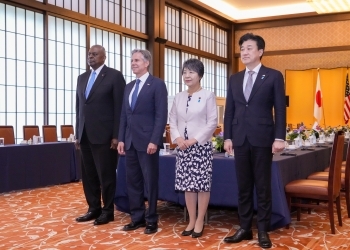The U.S.-Japan Security Consultative Committee met in Tokyo on July 28, 2024. The meeting included U.S. Secretary of State Antony Blinken and Secretary of Defense Lloyd Austin. Japanese Foreign Minister Yoko Kamikawa and Defense Minister Yasukazu Hamada were also there.
Shared Vision and Commitment
The Ministers stressed their strong commitment to a free and open international order based on the rule of law. They confirmed that the U.S.-Japan Alliance is key to peace and security in the Indo-Pacific region. Both countries promised to work together to tackle global threats and make their partnership stronger.
New Strategic Initiatives
The Ministers talked about new plans to make their alliance stronger. They want to upgrade their command and control systems. They also plan to work more closely on defense projects and improve their operations in different areas. These steps are part of building a stronger partnership after Prime Minister Kishida’s important visit.
U.S. and Japan Defense Commitments
The U.S. reaffirmed its commitment to Japan’s defense under Article V of the U.S.-Japan Treaty of Mutual Cooperation and Security. This includes a pledge to use its full range of capabilities, including nuclear deterrents, if necessary. Japan, in turn, emphasised its dedication to enhancing its defense capabilities. Including an increase in its defense budget and advancements in technology and cybersecurity.
Concerns About Regional Threats
The Ministers are worried about threats from China and North Korea. They criticised China for trying to change things in the East China Sea and South China Sea. The ministers were also concerned about China building more nuclear weapons. They stressed the need to keep peace near Taiwan. Also condemned North Korea for its missile tests and nuclear weapons.
Condemnation of Russia
The meeting talked about Russia’s actions. They strongly condemned Russia’s unprovoked war against Ukraine and breaking international laws. The Ministers criticized Russia’s close ties with China and North Korea. They said these actions are making global and Indo-Pacific security worse.
Middle East Instability
The Ministers recognized that instability in the Middle East has global repercussions, including for Indo-Pacific security. They condemned Houthi attacks that threaten regional and global economies and supported efforts for a ceasefire and a negotiated two-state solution to the Israeli-Palestinian conflict.
Enhancing Alliance Capabilities
To meet evolving security challenges, the Ministers outlined several key areas for enhancing Alliance capabilities:
–Command and Control: The U.S. plans to set up U.S. Forces Japan (USFJ) as a joint force headquarters. To improve coordination and operational effectiveness with Japan’s newly established Joint Operations Command (JJOC).
– Stand-Off Defense: Both nations are advancing cooperation on stand-off missile capabilities. Including the acquisition of Tomahawk missiles and other advanced technologies.
– Southwest Islands: Japan is increasing its defense presence in the Southwest Islands. With both countries committed to enhancing their bilateral presence. Along with defense activities in this strategic region.
– Readiness and Exercises: The Ministers emphasised the importance of joint exercises and realistic training scenarios. In order to maintain high readiness levels for both peacetime and conflict.
– Extended Deterrence: There will be a continued focus on strengthening U.S. extended deterrence. And improving strategic-level discussions through the Extended Deterrence Dialogue.
– ISR Cooperation: There has been progress in sharing intelligence, surveillance, and reconnaissance (ISR) information. Plans are in place to improve how they keep track of maritime activities and share information.
– Cross-Domain Operations: The Ministers committed to deepening cooperation in cyber, space, and warfare. And welcomed new working groups on information warfare and AI.
– Cyber and Information Security: They focused on getting better at cyber defense and protecting information. They want to improve how they work together and use a new system called Zero Trust Architecture. In order to make their security even stronger.
Collaborating with Allies and Partners
The U.S. and Japan are teaming up with other friendly countries. They want to work more closely with Australia and South Korea. They also support stronger ties with ASEAN, Pacific Island nations, and NATO. The goal is to keep the Indo-Pacific region open and free. They believe working together helps tackle big security problems.
Defense Equipment and Technology Cooperation
The U.S. and Japan are teaming up to improve their defense technology. They want to make new and better tech, strengthen their industries. And ensure they have reliable supply chains. By working together, they can stay ahead in technology and help keep the region peaceful. They’re focusing on making advanced missiles and other defense tools.
Their goal is to increase production and make sure their defense equipment is ready when needed. They’re also working on new defense technologies and research together.
Alliance Force Posture
The U.S. and Japan are improving their military plans to handle security better. They are updating U.S. military planes in Japan and changing the setup of Marine Corps units. The USS George Washington is coming back to Japan to help the alliance. Some U.S. troops will move from Okinawa to Guam. The goal is to strengthen defense and make less impact on local areas.
Environmental Issues and Humanitarian Assistance
The U.S. and Japan are working together to respond quickly to natural disasters and climate change. They are creating a task force to improve their disaster response. They are also addressing environmental issues like harmful chemicals and pollutants.
Women, Peace, and Security (WPS)
The U.S. and Japan are committed to involving women in security and peace efforts. They support women’s empowerment and leadership in conflict prevention and peacebuilding. They will continue working together on WPS initiatives and integrate these goals into their joint activities.
Investment in People for the Alliance
The U.S. and Japan value their strong friendship and want to build on it. They’re growing exchange programs to help young people understand each other’s cultures. Programs like TOFU and SEED are designed to build future experts who will support the partnership.

